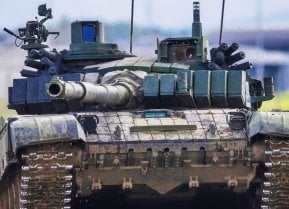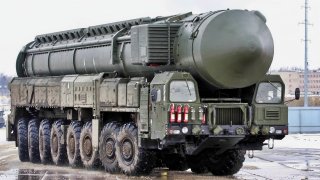Space War: Russia Could Deploy Nuclear Weapons Into Orbit
Concerns about potential Russian plans to deploy nuclear weapons in space were highlighted during a U.S. House Armed Services Committee hearing, where U.S. Assistant Secretary of Defense for Space Policy, John F. Plumb, expressed fears about an "indiscriminate" space-based nuclear weapon.
Summary: Concerns about potential Russian plans to deploy nuclear weapons in space were highlighted during a U.S. House Armed Services Committee hearing, where U.S. Assistant Secretary of Defense for Space Policy, John F. Plumb, expressed fears about an "indiscriminate" space-based nuclear weapon.
-Despite Russia's previous assurances and the restrictions of the 1967 Outer Space Treaty—which bans nuclear weapons and other WMDs in orbit—the recent veto of a UN Security Council resolution by Russia has raised alarms about their intentions in space.
-The potential deployment could endanger global satellite operations, affecting various essential services. The focus now shifts towards enhancing the resilience of space systems to mitigate such threats.
Concerns Grow Over Russian Plans for Space-Based Nuclear Weapons
Yesterday was "Star Wars Day" as in "May the Fourth" - but a real space war could be brewing as Russia could be seeking to deploy nuclear weapons in orbit.
Earlier this year, Russian President Vladimir Putin said he and his nation were completely against any deployment of nuclear weapons in space while the Russian Ministry of Defense flatly denied reports that Russia was developing a nuclear capability for space. U.S. officials aren't taking the Russian leader at his word – especially as Putin ordered an invasion of Ukraine after months of denying any operation was being planned.
Earlier this week, U.S. Assistant Secretary of Defense for Space Policy John F. Plumb stoked fears that the Kremlin could be in the process of developing what he termed an "indiscriminate" space-based nuclear weapon. Plumb expressed concerns about the implications of such a weapon at a hearing of the U.S. House Armed Services Committee on May 1, 2024, Aerotime reported.
"The concept that we are concerned about is Russia developing – if we are unable to convince them otherwise – to ultimately fly a nuclear weapon in space, which would be an indiscriminate weapon," Plumb warned, adding a nuclear weapon deployed in space would not distinguish between military, civilian, or commercial satellites.
If employed, it could have far-reaching consequences, rendering areas in low-orbit unusable by spacecraft for over a year.
Russia: In Violation of the Outer Space Treaty with Orbital Nukes?
During the "Space Race" of the 1960s, the Soviet Union, the U.S., and the UK signed the Outer Space Treaty of 1967, which governs the exploration and use of outer space, including the moon and other celestial bodies. A total of 110 nations have ratified the treaty, which details legally binding rules governing the peaceful exploration and use of space, prohibits the installation of nuclear weapons or any other form of weapon of mass destruction (WMDs) in Earth's orbit, stockpiling them on the Moon, on any other celestial body, or in outer space.
The treaty has been seen as playing a crucial role in maintaining peace in Earth's orbit for over 50 years – as it ensures that space is accessible to all countries without any national claim and limits the military's use of space for observation and communication applications.
The wording does leave some room for interruption, as the treaty forbids countries from deploying "nuclear weapons or any other kinds of weapons of mass destruction" in outer space. However, the term "weapons of mass destruction" is not defined, yet, it is commonly understood to include nuclear, chemical, and biological weapons. Moreover, the treaty does not prohibit the launching of ballistic missiles, which could be armed with WMD warheads, through space.
A War in Space?
Even as Russia has denied that it would deploy nuclear weapons to space, last month, it vetoed a United Nations Security Council resolution that had been crafted in response to reports that the country was developing a nuclear anti-satellite weapon.
Plumb explained that the deployment of nuclear weapons to space could "pose a threat to all satellites operated by countries and companies around the globe, as well as to the vital communications, scientific, meteorological, agricultural, commercial, and national security services we all depend upon."
He added that it is "not an imminent threat," but is still an area of concern, and one that Congress should take deadly seriously.
"The fact that Russia vetoed the resolution reaffirming a commitment they've already made is concerning," Plumb said.
Yet, as previously reported by Todd Harrison and Clayton Swope for The National Interest, Moscow may be unlikely to actually engage in a first strike in space.
"It would effectively be a kamikaze attack in space because it would likely take out many of Russia's own satellites along with whichever systems it would be targeting and the satellites of many other nations. It would be an act of desperation--much like Russia's repeated threats to use tactical nuclear weapons in Ukraine," Harrison and Swope noted – adding, "We should use this opportunity to refocus attention on building more resilient and protected space systems."
Author Experience and Expertise: Peter Suciu
Peter Suciu is a Michigan-based writer. He has contributed to more than four dozen magazines, newspapers, and websites with over 3,200 published pieces over a twenty-year career in journalism. He regularly writes about military hardware, firearms history, cybersecurity, politics, and international affairs. Peter is also a Contributing Writer for Forbes and Clearance Jobs. You can follow him on Twitter: @PeterSuciu. You can email the author: [email protected].


